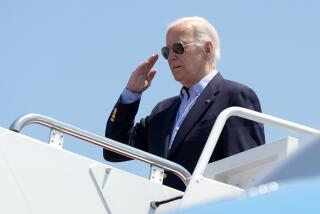THE BUDGET IMPASSE : Shutdown Is Rude Awakening for Federal Workers : Impact: From L.A. to Washington, furloughed employees bristle at learning they are ‘nonessential.’ Passports are delayed, museums close.
The little alarm on Roy Robinson’s wristwatch was set for 4 a.m. The television in his bedroom had been on all night. He focused his sleepy eyes on the flickering screen to learn whether he was to report to his job at the Department of Transportation or stay home, one of nearly a million federal workers furloughed Tuesday until God-knows-when.
He showered and shaved but refused to put on a suit and tie. This was his rebellion. Three networks were broadcasting the same message: Congress and the White House at a standoff. The government will shut down. Those employees deemed “nonessential” would not be paid today.
If this wasn’t insult enough, they all had to show up for work so they could be officially sent home. Robinson headed out into a cold and driving rain to be told that the services he rendered explaining regulations to pilots for 14 years would not be necessary.
“I don’t like it,” he said, steaming, outside of the bureaucratic hulk of a building in downtown Washington, shoving his hands a little deeper into the sweat jacket pockets against the cold. “Those people on the Hill who make these decisions, they were born with silver spoons in their mouths. They aren’t thinking of the people who work, the people who live from payday to payday.”
Workers Hit the Streets
With Congress and the President at a stubborn impasse, federal workers around the nation hit the streets. Scientists abandoned their laboratories, museums and monuments closed down, garbage went uncollected in the nation’s capital and illegal parking unpunished.
Government supervisors crudely sorted out what was a necessary service and what was not. Social Security checks would continue to be issued; all but a handful of Internal Revenue Service audits would halt. Health officials would not monitor outbreaks of influenza. New AIDS research would stop. The Smithsonian’s 16 museums and galleries would turn away tourists in droves, but keep a staff on hand to regulate climate control.
“If you have a dinosaur’s foot or the Wright brothers’ airplane or the first ladies’ gowns or George Washington’s sword, you don’t just turn off the lights and the heat and go home,” said a harried David Umanski, a Smithsonian spokesman.
Car pools were disrupted Tuesday, paychecks were uncertain. Passports were held up. Fran Harris of Studio City said that her family’s plan for a holiday trip to Rome--where she said her daughter is filming a movie with Sylvester Stallone--is jeopardized because she can’t get a passport for another daughter.
Harris’ friend, Bernie Abramson, shook his head.
“I hate the government,” he said.
In Los Angeles, the shutdown was haphazard, with some offices, such as the Army Corps of Engineers, remaining open while others, like the tax auditors, closed. “It changes all the time,” one white-haired worker said. “You’re in, you’re out. You’re up, you’re down. I’ve got a headache.”
The cutbacks were enormous. At the IRS, just 8% of the staff was kept on the job. About 76% of the Treasury Department’s 154,000 workers were furloughed. At the Environmental Protection Agency, all but 4,000 of its 18,000 employees were sent home.
Congressional leaders promised that furloughed workers would eventually be paid, but many of those sent home were uncertain. Families with two federal workers walked nervously on the edge of financial disaster. Many were already calculating potential losses and thinking about juggling finances. Even if they were paid, the money would come late. Paychecks would be shriveled just in time for Christmas.
“Congress keeps talking about the debt and the deficit and they seem to forget that we all have debt. How are we going to pay it if we don’t get paid?” wondered Dana Hill, a 25-year-old secretary at the Department of Health and Human Services.
They felt like pawns in a game of brinkmanship. “We’re just little Lego pieces they play with,” Bunny Nalls said before going back to put in a full day at the Department of Transportation’s highway division with the other “essentials.”
Angry at Congress
Furloughed workers began filing out of the federal building in West Los Angeles at 10 a.m. Tuesday, heading for home. They and the dozens of citizens being turned away at the front door saw themselves as victims of a ham-fisted political fight, with the bulk of their wrath directed at the Republican Congress, rather than at President Clinton.
“I really appreciate what the President is doing, and I don’t think he will back down on Medicare,” said Barbara-Jean DeSalles, who failed to get passports for her family for a planned holiday in Brazil. “I think this is being caused by the heartless Republicans, who want to put in all these stipulations that will hurt people’s lives.”
Veterans of previous government shutdowns felt an underlying anxiety that this stalemate is more serious. Government workers spoke of a new intransigence in Washington. “This time we are seeing more sweeping changes in what the government perceives people should get and what employees should do,” said Jason Burton, 31, who reviews claim applications at the Department of Veterans Affairs. “It used to be you had a government job and you were safe for life. Not any more.”
As he jumped in his black Chevy pickup to drive home to Hollywood, Burton displayed a handwritten sign: “Furloughed Government Employee--Will Work for Food.”
Many of them were resigned to the game of political chicken, but nevertheless annoyed that the government couldn’t even seem to shut down right. Massive federal bureaucracies, it seems, don’t screech to a halt. They are ratcheted down painfully, like peeling off a Band-Aid one millimeter at a time. And no single place was flung into greater turmoil than Washington, where half of the district’s 310,000 federal workers were idled.
At 12:15 p.m., Bob Napoli, a planning specialist at the Federal Emergency Management Agency, was still waiting to find out whether he would be sent home. He’d been there since 8:30. At this rate, with a lack of express buses during non-rush hours, he’d walk in the door at his suburban home close to 5 p.m. Some day off.
“It’s adding insult to injury,” he said.
Tourists Shown Exits
At Washington’s Air and Space Museum--the most visited museum on the globe--closed signs were taped up at 9 a.m., torn down at 10, and taped up again at noon.
“You have 15 minutes, and then we are closing,” Mike Fetter informed an unsuspecting tourist at 11:45 in the nicest voice he could muster. The staff tried bravely to soften the blow, directing visitors to sites that remained open--like the Bureau of Engraving and Printing. But eyes glazed over. One couple from Scotland clung as long as they could to “Apollo 11 Highlights” before the lights dimmed and a voice over the loudspeaker commanded: “Please proceed to the nearest exit.”
“We run a bed and breakfast in Scotland and when visitors come, we tell them what sites to see in Edinburgh,” May Donaldson explained in a brogue.
“And they are always open,” her husband, Jim, sniffed.
“We’re ashamed,” a teen-age exchange student from Russia sputtered, meaning the American government should be. “We came here to see all these museums and see American culture. It’s the capital of America. We have no such situation in Russia, the government being closed down.”
Around the country, visitors to national parks were mostly baffled because many were only partly closed. At Great Smoky Mountains National Park, spokesman Bob Miller said many roads were blocked for lack of crews to plow snow, but backcountry trails and some restrooms were open. Yosemite National Park remained open, although 270 of 570 rangers were furloughed. Entry fees were waived, costing the park an estimated $22,000 a day.
One IRS lawyer in Washington, prematurely riding the Metro home, wondered whether the entire process might not teach the government’s many critics something about the importance of the federal branch, considering the services that came to a halt.
At the federal Centers for Disease Control and Prevention in Atlanta, a phone message announces the shutdown and advises callers to notify their state health departments in the event of an outbreak or the need to report some other public health matter.
And the National Cancer Institute was struggling to keep its cancer information hot line to the public running at its usual level. “We consider that very, very important,” an official said. “Whenever it isn’t operating, we get very distressed calls from the public.”
At the Pentagon--where 260,000 civilians were furloughed and about 400,000 remained, confusion seemed to reign. Essentially, any activity that is essential to protecting U.S. national security is authorized to continue its operations. The rest--theoretically--have to shut down. But in reality, some of the decisions made little sense.
While military recruiting sergeants must report for duty, they will not be able to use their government cars. New recruits will not be able to report for induction.
But one place where the sting seemed to be hardly felt was Congress itself. After months of preaching that workplace rules that apply to others should apply to Congress, most Republican members apparently decided that the forced furloughs should not apply to their own staffs.
At a meeting of Republican congressional chiefs of staffs late Monday to discuss the impending shutdown, only a handful indicated their bosses planned to place “nonessential” workers on forced leave. Democratic offices were not exactly empty either.
Meanwhile, congressional staffers taped computer-generated buttons to their clothing which read: “Hi. I’m essential.”
Times staff writers Art Pine, Marlene Cimons, Gebe Martinez, D’Jamila Salem, Jim Gerstenzang, Colleen Krueger and Jube Shriver in Washington and Eric Malnic, Paul Feldman and Jim Rainey in Los Angeles contributed to this story.
More to Read
Sign up for Essential California
The most important California stories and recommendations in your inbox every morning.
You may occasionally receive promotional content from the Los Angeles Times.






